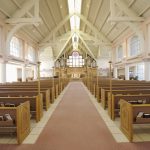Owning real estate comes with a host of potentially significant complications for a church that isn’t prepared to take them seriously. Some types of complication—disputes with neighbors, for example—are features that are common to all kinds of landowners. Other problems are unique to the church context.
Problems of title
Perhaps the most frustrating and complicated problems that can arise for a church that owns land is uncertainty about the land’s ownership. This can be especially true for churches that have a long history. Land that begins under the ownership of one or more individuals, who hold it in trust on behalf of the church, can get entangled in the personal affairs of the titled owners and their heirs. The title owner may pass away without resolving title, with heirs who are unsympathetic to the church or otherwise unavailable.
If title problems aren’t resolved, selling land or using it as collateral for a loan may be difficult or impossible. Churches should make sure to know precisely what their real estate titles say. If the church is the owner, confirm that the church’s organization is properly described in the property deed. This can be especially important if the church has changed its legal form over time. One significant reason that a church might choose to incorporate is to assign the church’s real estate to the corporation, which then owns all of the obligations associated with the land along with the land itself.
Pay close attention to the church’s governing documents
A church’s governing documents should address when and how the church’s real estate can be sold or altered in a significant way. Such guidelines are essential to protecting the real estate as a major asset. But they can also create frustrating problems in some situations. For example, if a church’s governance documents tie real estate matters to an outside authority—for example, the parent organization of the wider denomination—local leadership may be limited in its options.
Treat real estate as a source of risk
Owning land involves a certain degree of risk. Visitors, welcome or not, can get injured and sue the church. The church’s insurance policies need to account for this risk. “Risk” can also be thought of as the potential that a bad decision will be made to damage the property or lower its value. Before doing any transactions that may affect the church’s real estate, it’s a good idea to talk to an expert, whether that’s a real estate attorney, experienced contractor, or others.
Talk to an experienced church law attorney about your real estate questions
The Church Law Center of California provides legal counsel to religious and secular nonprofits. We can help your church navigate the complicated world of real estate law, with an eye toward protecting the long-term interests of the church. To learn how we can help your church, call us today at (949) 892-1221 or reach out to us through our contact page.






